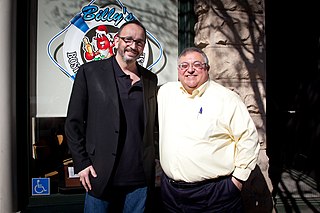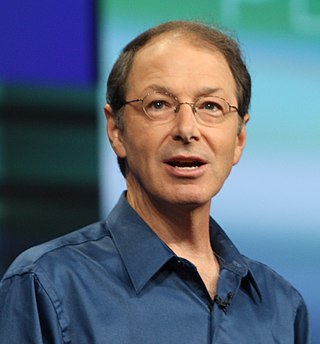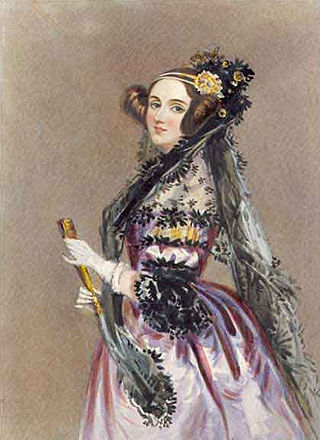Related Research Articles

Douglas Carl Engelbart was an American engineer and inventor, and an early computer and Internet pioneer. He is best known for his work on founding the field of human–computer interaction, particularly while at his Augmentation Research Center Lab in SRI International, which resulted in creation of the computer mouse, and the development of hypertext, networked computers, and precursors to graphical user interfaces. These were demonstrated at The Mother of All Demos in 1968. Engelbart's law, the observation that the intrinsic rate of human performance is exponential, is named after him.
Bruce A. Lehman served from 1993 to 1998 as Assistant Secretary of Commerce and Commissioner of the United States Patent and Trademark Office (USPTO). Lehman is noted for being the first openly gay man to be confirmed by the U.S. Senate.

SRI International (SRI) is an American nonprofit scientific research institute and organization headquartered in Menlo Park, California. The trustees of Stanford University established SRI in 1946 as a center of innovation to support economic development in the region.
Computer ethics is a part of practical philosophy concerned with how computing professionals should make decisions regarding professional and social conduct.

Isaac Robert "Ike" Nassi, born 1949 in Brooklyn, New York, is currently CTO and chairman at TidalScale, Inc. in Campbell, CA, and Adjunct Professor of Computer Science at the University of California, Santa Cruz. He is known for creating the highly influential Nassi–Shneiderman diagram notation. He also helped design the Ada programming language.

Richard Farris Rashid is the founder of Microsoft Research, which he created in 1991. Between 1991 and 2013, as its chief research officer and director, he oversaw the worldwide operations for Microsoft Research which grew to encompass more than 850 researchers and a dozen labs around the world.
Deborah Louise McGuinness is an American computer scientist and researcher at Rensselaer Polytechnic Institute (RPI). She is a professor of Computer, Cognitive and Web Sciences, Industrial and Systems Engineering, and an endowed chair in the Tetherless World Constellation, a multidisciplinary research institution within RPI that focuses on the study of theories, methods and applications of the World Wide Web. Her fields of expertise include interdisciplinary data integration, artificial intelligence, specifically in knowledge representation and reasoning, description logics, the semantic web, explanation, and trust.
The IT History Society (ITHS) is an organization that supports the history and scholarship of information technology by encouraging, fostering, and facilitating archival and historical research. Formerly known as the Charles Babbage Foundation, it advises historians, promotes collaboration among academic organizations and museums, and assists IT corporations in preparing and archiving their histories for future studies.
Stanford University has many centers and institutes dedicated to the study of various specific topics. These centers and institutes may be within a department, within a school but across departments, an independent laboratory, institute or center reporting directly to the dean of research and outside any school, or semi-independent of the university itself.
Donn B. Parker (1929-2021) was an information security researcher and consultant and a 2001 Fellow of the Association for Computing Machinery. Parker had over 50 years of experience in the computer field in computer programming, computer systems management, consulting, teaching, and research.
Stephen Brobst is an American technology executive.
Susan Owicki is a computer scientist, Association for Computing Machinery (ACM) Fellow, and one of the founding members of the Systers mailing list for women in computing. She changed careers in the early 2000s and became a licensed marriage and family therapist.

Susan Gertrude Braden is a former judge of the United States Court of Federal Claims. Braden was appointed to that court in 2003 by President George W. Bush. She was appointed chief judge by President Donald Trump on March 13, 2017 and assumed senior status on July 13, 2018 and retired in 2019.
The National Cyber Security Hall of Fame, founded by Larry Letow and Rick Geritz, was established in 2012 to recognize the contributions of key individuals in the field of cyber security; its mission statement is, Respect the Past - Protect the Future. According to its website, it is designed to honor the innovative individuals and organizations which had the vision and leadership to create the fundamental building blocks for the cyber security Industry. The organization also highlights major milestones in the industry's 40-year history through a timeline representation, which includes inductees and their corresponding accomplishments.

Stephen P. Boyd is an American professor and control theorist. He is the Samsung Professor of Engineering, Professor in Electrical Engineering, and professor by courtesy in Computer Science and Management Science & Engineering at Stanford University. He is also affiliated with Stanford's Institute for Computational and Mathematical Engineering (ICME).

This is a timeline of women in computing. It covers the time when women worked as "human computers" and then as programmers of physical computers. Eventually, women programmers went on to write software, develop Internet technologies and other types of programming. Women have also been involved in computer science, various related types of engineering and computer hardware.

Dan L. Burk is Chancellor's Professor of Law at the University of California, Irvine School of Law and is a founding member of the law faculty. His areas of expertise include intellectual property, gene patenting, digital copyright, electronic commerce and computer trespass.
References
- ↑ Computer Law: A Comprehensive Update, Computer Law Association, 1979,
For the few of you I imagine who do not know Susan, I will give you a brief biographical sketch...
- ↑ Stone, Keith (January 13, 1991). "Computer chip inventor gains valuable patent along with vindication". Herald-Journal.
- ↑ Edgar, Stacey L. (2002), Morality and Machines: Perspectives on Computer Ethics, ISBN 0-7637-1767-3,
Susan Nycum, writing in 1978, long before any of these more recent decisions, and even before Diamond v. Diehr extended patents to software, referred to the following...
- ↑ "Susan Nycum", 2004 Hall of Fame Award Inductees, SIGUCCS, 5 Oct 2009
- ↑ United States, Office of Technology Assessment, Congress (September 1981). Computer-Based National Information Systems. DIANE Publishing. p. iv. ISBN 978-1-4289-2441-3.
{{cite book}}: CS1 maint: multiple names: authors list (link) - ↑ "MEMBER PROFILE: Susan H. Nycum". California Academy of Distinguished Neutrals . Retrieved November 8, 2013.
- ↑ Parker, Donn B.; Nycum, Susan (1973). Computer Abuse. Stanford Research Institute.
- ↑ Cortada, James W. (2007). The Digital Hand, Vol 3 : How Computers Changed the Work of American Public Sector Industries. Oxford University Press. pp. 133–134, 390. ISBN 978-0-19-803709-5.
- ↑ Leavitt, Don (November 8, 1976). "Attorney Suggests Congress as Forum: Much Talk But Little Action Seen for Software Patents". Computer World.
- ↑ "Susan Nycum Short Biography". Nycum.net. Archived from the original on October 25, 2013. Retrieved November 8, 2013.